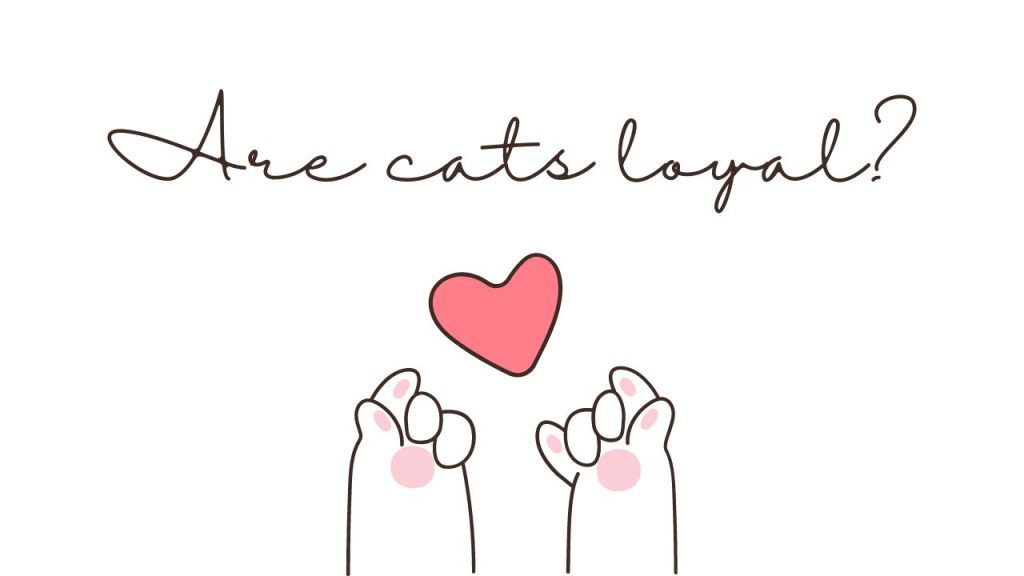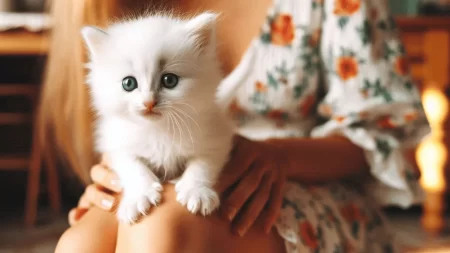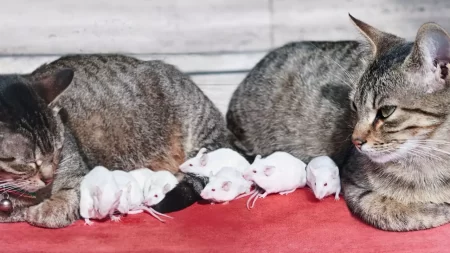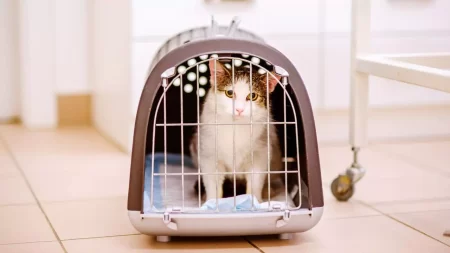Most people think cats aren’t the most loyal animals. But what if we told you that cats can actually be just as loyal as dogs? Whether you’re a feline fan or not, this blog is sure to change your mind about cats and their loyalty. Read on to find out more!
Cats are one of the most popular pets around the world for their independent nature and seemingly mysterious personalities. For centuries, cats have been admired for their strong link with their owners and some even seem to exhibit a more loyal and emotionally connected relationship than other animals. But what is the truth of this bond? Do cats really feel loyalty or do we merely project our own emotions onto them? In this guide, we will take an in-depth look at the facts and fiction surrounding cats and loyalty to help you explore your cat’s true feelings.
History of Cat Loyalty
Cats have been considered to be loyal companions for centuries, with historical records stretching back as far as the Ancient Egyptians. There is evidence of cats being kept in households to provide companionship and protection, and even to ward off evil spirits. In Ancient Greece, cats were venerated for their intelligence and mastered skills, with some cats being trained for use in hunting or warfare.
During the Middle Ages, cats were also seen as protectors of homes and farms alike but as different cultures rose, so too did new superstitions and fears of cats. Some believed they could bring bad luck while others viewed them as demonic creatures or bringers of evil omens. Despite these fears, they were still kept around due to their loyalty and ability to catch rodents in and around the home.
Today, cats remain popular pets who are valued for their independent nature but also for their affectionate behavior toward humans. Cats will often develop strong bonds with their owners and show signs of loyalty through behavior such as headbutting or purring when stroked or patted. Studies have suggested that much like other animals such as dogs, cats are capable of forming deep emotional bonds with humans which can lead to loyal relationships if done correctly.
Types of Cat Loyalty
Cats are often thought to be independent creatures, but many pet owners would attest to the fact that cats can be incredibly loyal and loving family members. Cats come in a variety of shapes and sizes, with a range of personalities that can create different types of loyalty. Let’s take a look at some of the common forms of loyalty seen in cat companionship.
Primary Loyalty
Primary loyalty is when a cat chooses one person as “theirs” and showers them with love and attention. These cats act more like dogs in their need for human connection, following their person around for cuddles and affection wherever they go.
Situational Loyalty
These cats tend to show loyalty depending on their current situation or mood. They may be more standoffish than others when first meeting someone, but could become fiercely loyal if the visitor shows them any type of kindness or understanding.
Fearful Loyalty
These cats often appear shy or fearful around strangers until they get to know them better—once they do, they become fiercely loyal to look out for their people by actively scaring away any outsider that comes too close.
Extroverted Loyalty
As their name implies, these cats are especially outgoing and friendly with strangers—confirmed by the amount of head-butting they exhibit whenever someone new comes over! They often instantly shower unfamiliar faces with love and trust, even if those guests don’t reciprocate the same warmth right away!
Factors Influencing Cat Loyalty
Cats have been left with a reputation for being aloof and independent, not particularly loyal companions. But researchers have found that factors such as breed, living environment, gender, and individual personality can all play a role in determining the level of sociability and loyalty your cat may display.
Breed
Some cat breeds, like Ragdolls, Maine Coons, and Siamese, are known to be more outgoing social cats that may develop close bonds with their owners.
Living Environment
Cats that live exclusively indoors tend to form stronger bonds with their human caregivers. Even if they live in a multi-cat household, cats that are primarily or only allowed to stay indoors are likely to be more bonded to people than cats who spend time outdoors.
Gender
Male cats tend to show more independence than female cats due to gender-based behaviors; however, some studies suggest female cats may be more loyal overall.
Individual Personality
Each cat is unique and can vary greatly in terms of its interaction with our interaction preferences towards humans. The bond of loyalty between an owner and a cat has been observed in those cats who are interested in interacting with humans; they seek attention from people they’re familiar with when they trust them and know they’ll receive comfort or reward during petting sessions. Owners also report increased loyalty over time as their relationship evolves and deepens as the cat ages.
Cat Loyalty in Different Cultures
Cats have had a special relationship with humans since ancient times, and this has produced a range of cultural beliefs around cat loyalty. In Egypt, cats were thought to be a sign of good luck and loyalty, for example. In Japan, cats are thought to have been loyal companions to samurai warriors. Chinese mythology refers to cats as “tigers” and states that they are loyal animals with special powers.
In the West, most cultures recognize cats as intelligent but independent creatures with their own needs outside of human influence. Some sources suggest that wild cats may have even been so loyal that they brought food back home to their owners. Many modern pet owners claim their cats are quite loyal and follow them around like puppy dogs – even if there’s no material reward in it for them! Studies have also suggested that feline-human relationships appear similar in many respects to canine-human relationships.
Ultimately, how loyal a cat depends on many factors including its upbringing, individual personality, and the nature of the bond between pet and owner. Despite competing interpretations throughout history, most people today would agree that while cats can be independent at times and not necessarily show consistent overt signs of affection or loyalty (such as dogs), they offer their own kind of wise companionship at all times – if we simply make the effort to get know them better.
Benefits of Cat Loyalty
Cats have been beloved family members since ancient Egypt and continue to capture our hearts to this day. Although widely thought of as being a solitary animals, cats can form incredibly strong bonds with their human caregivers and show loyalty well beyond what is often considered typical of an indoor pet. One of the benefits that cats offer when it comes to loyalty is their remarkable ability to remember their owners even after long periods of time apart. Cats are able to form lasting memories that extend beyond routine everyday moments, making them more likely to remember owners even after months or years apart.
Another benefit that cats offer when it comes to loyalty is their unconditional love and acceptance. Despite being seen as independent creatures, cats are actually quite social and enjoy forming one-on-one connections with certain humans. Cats will often show outright affection towards certain people, such as purring or gentle head butting, and will express joy upon reuniting with them after a period of separation.
Finally, cats are also capable of true monogamous relationships. Many humans believe in the old adage “once a cheater, always a cheater” – but in the case of cats, this simply isn’t true. Cats may bond deeply with one person while simultaneously rejecting all other potential mates; they are often loyal until death do them part!
Overall, cats are capable of forming deep bonds with their human families and displaying extraordinary levels of loyalty over long stretches of time – making them some of the most beloved pets on earth!
Challenges of Cat Loyalty
It’s true that cats can be very loyal, but this is often something that must be earned. Cats rarely show unconditional loyalty. Their independent nature presents a challenge for owners in terms of fostering the kind of relationship and environment that encourages loyalty. Cats are fastidious animals and there are certain things their owners must do in order to make them feel safe, secure, and happy.
The first step is to create an environment where cats feel comfortable expressing themselves by offering them a space to play, scratch, hide and explore as well as scratching posts and multiple litter boxes. Quality time can help deepen the bond between cat and owner as well — petting your cat for 10 minutes a day has been shown to reduce stress levels in both the cat and the human. Feeding your kitty at regular times also reinforces trust; if your cat knows when they will get their meals they develop a sense of security knowing that they will have enough food without having to worry or scavenge on their own. Grooming is another activity shared by cats and owners; brushing helps build mutual trust as it requires both partners to stay calm and relaxed while it’s going on! Finally, honoring boundaries is key – while some cats may like attention at any given time others need space or change quickly and tire of being handled; respecting individual preferences helps foster acceptance between two parties allowing for closer bonds that are built upon mutual respect rather than forced attentiveness or dependence from either party.
Conclusion
After considering the facts surrounding feline loyalty, it seems clear that while cats are not always loyal in the same way people expect dogs to be, they can still form strong bonds with their owners. Each cat has its own unique personality and will show affection in different ways than a dog might. A cat’s loyalty is often expressed through its love of spending time with its human companion, preference for its owner’s affection, and attentiveness when cared for. Those lucky enough to become a cat’s person know that it can be just as rewarding an experience as having a loyal canine companion.







